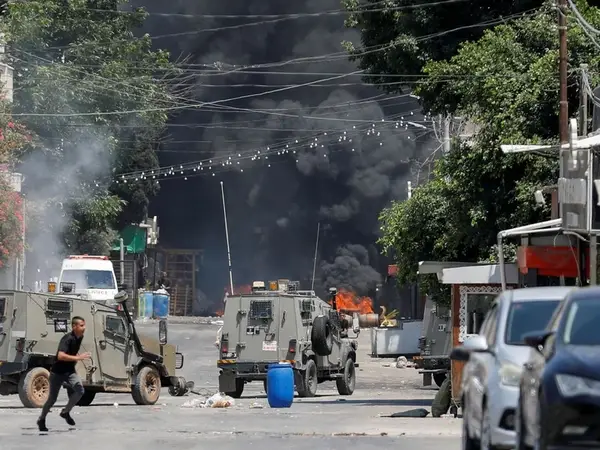Israel says its ongoing offensive in the Palestinian city of Jenin in the West Bank is aimed at Iran-backed militant groups Palestinian Islamic Jihad and Hamas.
Foreign Minister Eli Cohen said Monday: "We don’t have a fight with the Palestinians, actually, our fight is with the proxies of Iran in our region, which is mainly with the Hamas and the (Palestinian) Islamic Jihad, both terrorist organizations financed by Iran.”
He went on to say that "due to the terror organization and the funds they receive from Iran, the Jenin camp has become a center for terrorist activity”.
The incursion, which resembled the wide-scale military operations carried out during the second Palestinian uprising two decades ago, took place two days after the Islamic Jihad's Secretary-General Ziyad al-Nakhala said that anti-Israeli actions in the West Bank reflect Iranian Supreme Leader’s directives.
“There was a great focus in order for the West Bank to move from a state of coexistence and calm, to a state of resistance that we see today, and of course all of this is under the directives of Ali Khamenei,” stated al-Nakhala. He said the recent visit to Tehran was crucial: “During our last meeting with him in Tehran, he renewed the call for that and for the development of resistance in the West Bank.”
Israel sent drones to strike targets in a militant stronghold in Jenin early Monday and deployed hundreds of troops in the area. The attack set off a gunbattle lasting into the morning. Israeli troops remained inside the Jenin refugee camp at midday Monday.
Lt. Col. Richard Hecht, an army spokesman, said the goal of the operation was to destroy and confiscate weapons, adding: “We’re not planning to hold ground. We’re acting against specific targets.”
The foreign minister's remarks were echoed by the Israeli Ambassador to the United States Mike Herzog, who also said on Monday that Jenin and its refugee camp have become a base for Iran and that Israel cannot stand by as its citizens are targeted by terrorists.
The operation followed growing domestic pressure for a tough response to a series of attacks on Israeli settlers, including a shooting attack last month that killed four Israelis.
Retired Brig. Gen. Amir Avivi, who served as a battalion commander in the northern West Bank in 2002, described Monday’s operation as a “raid” in which the army moves in and then withdraws, but added that the size of the force indicated the operation could last “for a longer period of time, not just a few hours, but maybe a few days.”
Palestinian health officials said at least seven Palestinians were killed and 27 wounded in Jenin, while another man was killed in the city of Ramallah after being shot in the head at a checkpoint. In Ramallah, Palestinian Prime Minister Mohammad Shtayyeh condemned the Israeli military raid, calling it a "new crime."
Iran’s Foreign Ministry spokesman Nasser Kanani described the attack as a “tragic incident” and an example of “state terrorism,” but went on to add a line of the regime’s propaganda in it, saying: “Crime is institutionalized in the nature of the Zionist regime. The latest crime in Jenin showed once again that peace and compromise cannot deter the regime’s war machine and that this regime is neither trustworthy nor seeking peace.”
Iran International reported in May that Iran has also urged Hamas to join Islamic Jihad in a new round of attacks against Israel following the killing of three militants in Gaza. Tehran exerted strong pressure on Hamas to respond to assistance it has received over the years and unite with Islamic Jihad to launch a fresh wave of attacks, informed sources said.
According to Israeli Defense Minister Yoav Gallant in April, Iran is the “driving force” of a recent multi-front escalation with Israelis through its proxies across the region, funding Hamas – that rules the Gaza Strip -- with $100 million annually with additional funding worth tens of millions of dollars going to the second largest terror group in the Palestinian enclave, the Palestinian Islamic Jihad. Galant said the regime also provides Hezbollah in Lebanon with $700 million a year, as well as “knowledge and strategic weaponry” such as precision-guided munitions.
The evolution from guerrilla-terrorist militias to armies results from a long process initiated by Tehran with the active assistance of Hezbollah in Lebanon. The escalating events in recent months have shown the ongoing coordination and consultation among the top leaders of Hamas, Hezbollah and PIJ in Beirut, Damascus, and Tehran, with the aim of creating a united front facing Israel from Iran-supported Lebanon, Syria, Gaza, and the West Bank.
